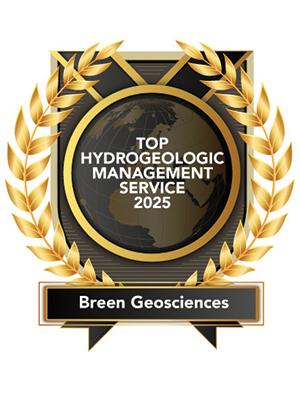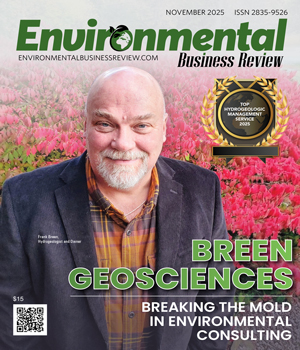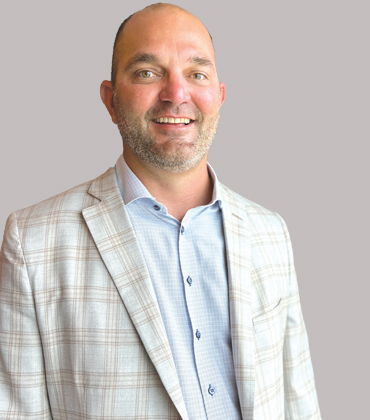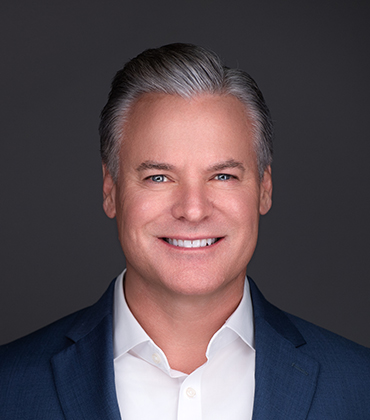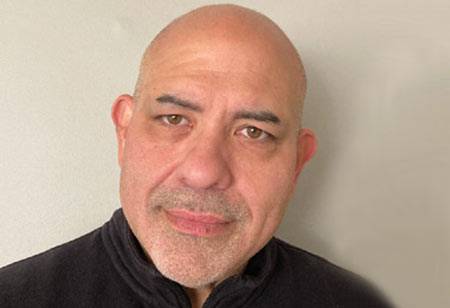Thank you for Subscribing to Environmental Business Review Weekly Brief
Environmental Business Review: Specials Magazine
Frank Breen started Breen Geosciences in 1998 with a vision to break the mold in environmental consulting. He had no interest in building a large firm with multiple offices, extensive staff, and layers of management. Instead, he focused on creating a nimble operation where clients work directly with the expert managing their projects, and where flexibility allows him to respond effectively to each situation. That approach has guided his work ever since. Breen is a hydrogeologist with 36 years of experience and a master’s degree from the University of Waterloo. Throughout his career, he has worked on a wide range of environmental projects, including Federal Superfund sites, state and provincial cleanup projects and Brownfield redevelopment. On the way, he draws on his experience in hydrogeology, geology, geochemistry, risk assessment, and litigation support to devise solutions that actually work. He has developed groundwater and contamination transportation models and strategies for remediation of impacted sites, and has even provided expert testimony in some of the most challenging cases in environmental matters in North America. Much of this work has been his own, offering him the freedom to do everything practically and in a hands-on manner that some larger firms would not. “My goal has always been to serve clients directly, combining expertise, innovation, and independence to solve complex environmental challenges while fostering trust that lasts,” says Breen. Flexibility defines Breen’s practice. He shapes his role to fit what each client actually needs. Sometimes, he takes on a project from start to finish. He often joins an existing team for a short-term role or works independently under a 1099 contract. He sometimes acts as the primary contractor, coordinating specialized subcontractors. Whatever the situation, he stays directly involved, responds quickly, and takes responsibility for the results. This approach has earned trust over the past twenty-five years and fostered long-term relationships with municipalities, manufacturers, and legal teams. Breen GeoSciences has stayed nimble and focused, proving that independence isn’t a limitation but a way to deliver flexible, clear, and technically precise work.
Top Aquatic Restoration Firm 2025
Beneath the water’s surface lies a world that feeds us, shields our coasts, and breathes life into the planet. But today, aquatic ecosystems are disappearing at an alarming pace, with more than two football fields of seagrass lost every day. Algae blooms, declining vegetation, and rising coastal pressures are reshaping waterways and shorelines. With most of humanity living near coasts or freshwater bodies, the stakes are high. Florida-based Sea & Shoreline has earned its reputation by tackling these challenges with proven science, scalable restoration practices, and a steadfast commitment to both the environment and the communities that rely on it. Backed by more than two decades of experience and hundreds of successful projects, the company is among the most established players in aquatic restoration. “Ecosystem restoration breathes life into both nature and communities, strengthening wildlife, tourism, fisheries, property values, and overall quality of life,” says Carter Henne, CEO and chairman. The company enacts this vision by restoring degraded systems into thriving habitats that support fish, wildlife, recreation, and local economies. It restores submerged aquatic vegetation and seagrass meadows, manages dredging and propeller scar repair, and constructs oyster reefs, wetlands, living shorelines, and breakwaters. Sea & Shoreline’s approach goes beyond quick interventions, focusing on watershed health, nutrient management, and long-term resilience. Its turnkey solutions are designed to endure future pressures. Driving this effort is one of the world’s largest company-owned aquaculture nurseries, dedicated to seagrasses and backed by patented processes. Coral restoration is another expanding area, with surveying, mapping, and mitigation banking. All are guided by a simple principle: restoration must be cultivated and maintained like agriculture. No farmer expects to plant seeds and return months later to a healthy crop. Similarly, aquatic systems must be carefully tended until they are able to flourish on their own. This integration of biology, farming techniques, and proprietary technology underpins the breadth and depth of its services. The Kings Bay Restoration Project in Crystal River demonstrates the impact of these services. Years of nutrient loading and invasive algae created Lyngbya, drove away sea life searching for sustenance and shelter and limited ecotourism. Sea & Shoreline was hired by the non-profit Save Crystal River to dredge muck, replant grasses, and protect them until the ecosystem was fully reestablished. Today, over 100 acres have been restored and 850+ previously unidentified spring vents have been opened, resulting in better water clarity, the return of manatees and other sea life, and a thriving ecosystem. Property values along the waterfront have risen in parallel, illustrating how ecological health translates directly into economic and social gains..
Data-Driven Waste Managed Services of the Year 2025
For most businesses, waste management rarely reaches the top of the strategic agenda. Yet, day-to-day operations can become an invisible drain on resources, time, and money. A retail store manager might find herself dealing with overflowing containers and upset customers, unsure if a missed pickup was ever scheduled or completed. A facilities director may spend hours reconciling invoices filled with charges that cannot be verified. Sustainability officers, meanwhile, often scramble to compile diversion reports only to find that the necessary data is scattered across multiple vendors. These frustrations may seem mundane, but they are recurring pain points that affect thousands of companies across the U.S. Waste Harmonics Keter recognizes that waste should not be an afterthought or an operational burden. Instead, it should be a streamlined function with clarity, accountability, and measurable outcomes. The company has created a model that delivers scalable, reliable solutions by combining nationwide coverage with a localized, customer-first approach and layering on advanced technology. For clients, the result is predictability, cost efficiency, and sustainability support, backed by a team committed to proactive partnership. “Customer centricity is what we do every day,” explains Stephen Mohan, chief commercial officer of Waste Harmonics Keter. “Clients value consistency, scalability, and reliability, and we’ve built our model around those needs. That is how we deliver real trust.” Offering Unified Reporting Platform The waste industry has long suffered from a lack of visibility and accountability. Mohan notes that one of the most common frustrations businesses face is not knowing whether they have been serviced. This creates uncertainty, especially when containers overflow or clients are left second-guessing if a vendor has fulfilled obligations. Invoicing is another widespread source of pain, with charges often difficult to verify and disputes consuming valuable time. Sustainability, too, becomes a struggle in such an environment. Without reliable data and integrated reporting, companies cannot track diversion goals or demonstrate compliance with internal or regulatory requirements. Instead of waste management supporting their operations, businesses often find themselves dragged into it, managing inefficiencies that take focus away from core priorities.
CXO INSIGHTS
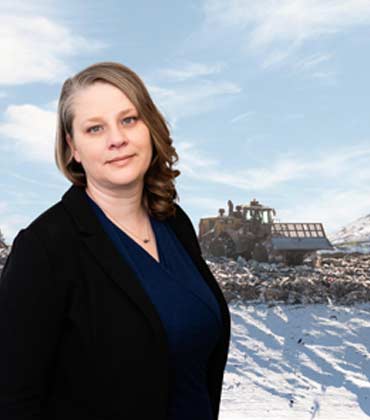
From Landfill To Leadership: Driving Sustainability In The Waste Industry
Amy Davies, P.E., Regional Environmental & Compliance Manager, Casella Waste Systems, Inc
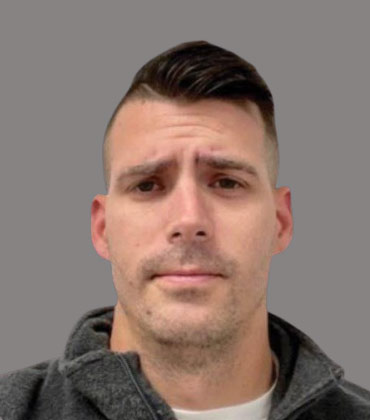
Safety First, Innovation Always: Shaping the Future of EHS
Dustin Workman, Environmental, Health and Safety Director, Sysco
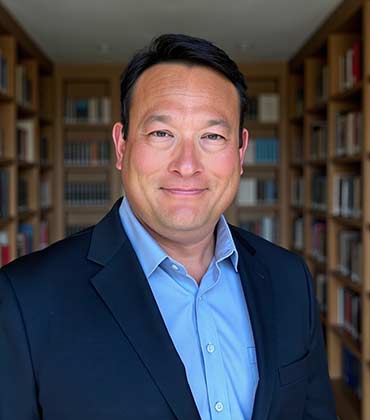
Reshaping Risk Management with a Safety-First Culture
Jack Suehiro, Vice President of Health, Safety & Environment, MasTec West
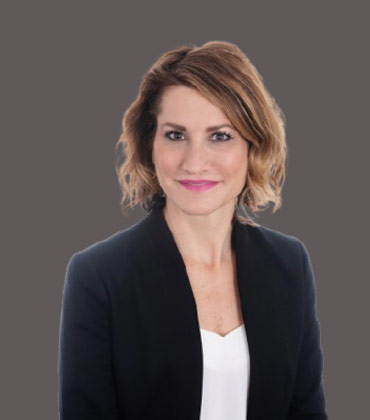
Leading Safety and Sustainability with Purpose
Lori Santoli, CSP, Vice President of Global EHS, International Flavors and Fragrances (IFF)
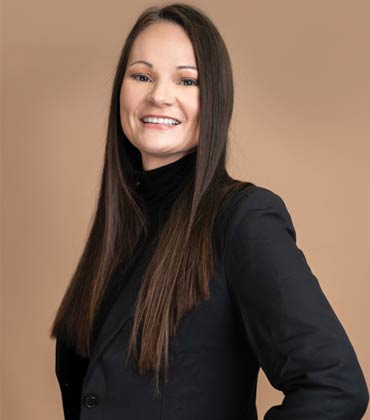
Compliance as a Blueprint for Resilient Growth
Tatiana Costa, Director of Environment, Health and Safety, Shehadey Family Foods

Charting the Path to Hydrogen Economy for a Sustainable Tomorrow
Henry Hui, Corporate VP, H2 Strategy & Energy Infrastructure, Nikkiso Clean Energy & Industrial Gases

The Role of Quality Control in Construction Management
Joffrion Beasley, Director of Quality Control, Chamberlin Roofing & Waterproofing
IN FOCUS
Adapting Hydrogeologic Services for Climate-Resilient Communities
Hydrogeologic management services integrate technology, collaboration, and sustainability to ensure efficient groundwater use, address contamination risks, and support climate-resilient, community-driven water strategies.
Smart Waste Solutions: Paving the Way for Sustainable Urban Environments
Data-driven waste managed services are redefining operational behavior, balancing innovation with infrastructure, and unveiling strategic opportunities across evolving environmental networks.
EDITORIAL
Leading a New Wave of Environmental Innovation
From restoring the natural rhythm of rivers and wetlands to using analytics for smarter waste solutions, today’s environmental leaders are advancing how we sustain the planet’s core systems. Aquatic restoration firms are breathing life back into damaged ecosystems, while data-driven waste management services are turning disposal into intelligent resource recovery. Complementing these efforts, hydrogeologic management services are ensuring the responsible use and protection of groundwater.
In this edition of Environmental Business Review, we explore innovations uniting aquatic restoration, data-driven waste management and hydrogeologic services that are together shaping a smarter and greener environmental future.
The cover features Breen GeoSciences, a leader in hydrogeologic and environmental consulting. It combines scientific expertise, advanced modeling and hands-on problem solving to deliver effective, lasting solutions in groundwater management, contamination assessment and ecosystem restoration.
This edition also highlights leaders advancing environmental stewardship through innovation and accountability. Thomas Fawcett, director of environmental resources and precision ag at Heartland Co-op, promotes a farmer-focused model aligning agricultural productivity with conservation. Dustin Workman, environmental, health and safety manager at Sysco, focuses on fostering workplace safety and sustainability through technology, teamwork and a culture of continuous improvement.
We hope this edition inspires new perspectives on the future of environmental innovation, where science, data and sustainability unite to restore ecosystems, manage resources responsibly and build a cleaner, more resilient world for generations to come.

